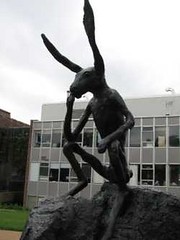You have /5 articles left.
Sign up for a free account or log in.
A recent post by Emily Ford at In the Library With a Lead Pipe, a blog that publishes substantial, sourced, peer-reviewed essays that are always worth reading, asked us to think about what we do and why we do it. That’s a wonderfully clear way to ask how our philosophy of librarianship is applied in daily practice and how the things we do articulate our beliefs, for better or worse.
Ford usefully unpacks the difference between having values and demonstrating value. Libraries are suddenly obsessed with demonstrating value, but measures of value that become unanchored from philosophical values can be destructive. (This is an issue for all of higher education. In the rush to prove our value, leaders sometimes toss our values overboard.) She urges librarians to be more reflective and intentional about our work, to shift our thinking from mere practice to a more thoughtful praxis, to weigh the values inherent in everything we do so that our choices can become rooted in commonly-held principles.
philosophical values can be destructive. (This is an issue for all of higher education. In the rush to prove our value, leaders sometimes toss our values overboard.) She urges librarians to be more reflective and intentional about our work, to shift our thinking from mere practice to a more thoughtful praxis, to weigh the values inherent in everything we do so that our choices can become rooted in commonly-held principles.
There are a few things librarians tend to agree on when we talk about what we do. We collect and preserve knowledge to support the creation of new knowledge. (“Knowledge” as I am using it here is not just the record of scholarship, it includes the material expression of culture generally. Public libraries look very different than academic libraries, and an academic library supporting a community college will look different than a research university’s library, but we share a common sense of what we do, if not how.) Included in that general description of our work are the more mundane tasks of selecting and acquiring materials, making those materials findable, helping people learn how to help themselves to those materials, and providing a commons where people can encounter, share, and create knowledge, where knowledge can escape its disciplinary confines. Those tasks are carried out locally, though our values tend to transcend borders.
The “why” is a bit fuzzier. Librarians believe knowledge is liberating, that to be liberating it must be available to all, and that we must, as a society, value the free expression of ideas. In a nutshell, “why” can be expressed by a couple of mottos. First, that Biblical motto engraved on many academic buildings of a certain age: seek the truth, and the truth will set you free. Second: free to all.
But our society has changed a great deal since those words were carved in stone. (If anything is engraved over library doors these days, it's likely to be the name of a wealthy donor.) Where we once had faith in wisdom, we now have faith in markets, and the market defines “free” very differently than librarians once did. In market terms, to be free means to be without obligations to others, free to compete and triumph. It also means a low, low price point. Libraries’ daily practices in acquiring, accessing, and sharing knowledge have absorbed that new understanding in ways that have radically altered both what we do and why. What we do now is provide information at the low, low price of zero. Why we do it is to make individuals more productive. Faculty think the library’s purpose is to pay for the information they need to produce papers to present and publish. Students think the library is a devilishly complicated shopping platform where they gather ingredients to produce papers. (If they ask a librarian for help, chances are it will be in composing the complicated ingredients label required by law.) Librarians begin to believe their value as a wallet and a shopping assistant is an expression of a philosophical value, “to provide the information our community members need.” But that’s a function, not a value. That’s like taking “the customer is always right” as a higher calling. The practices that assume satisfying individual needs are what a library is for runs counter to the communal nature of a library and the deeper values of librarianship.
If we were to question our current practices on the basis of those deeper values, we would make different decisions. We would oppose the massive transfer of ownership of knowledge from communities to corporations. We would stop satisfying community members’ immediate needs at the expense of the future. We would debate the wisdom of supporting individual productivity rather than access to and the advancement of knowledge, which is inherently communal. Knowledge cannot be self-centered. Advancing knowledge only works when it's shared.
The value of our profession and of the library as a social institution is that we are uniquely positioned to see the big picture, to recognize patterns in the ways societies create and share knowledge. Our value is also in our public purpose: to defend freedom as we once defined it.
The tragedy is that we haven't done that. All the more reason to take Emily Ford's advice and think about not just how to get things done, but what we should be doing - and why it matters.

